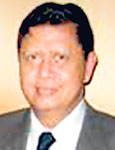An Indonesian and an Austrian are to form the panel of experts to advise UN Secretary General Ban Ki-moon on accountability issues relating to the last stages of the separatist war in May last year.
The move, a prelude to a possible UN investigation into alleged war crimes, both by troops and Tiger guerrillas, is to be announced in New York in the coming week. This is after Lyn Pascoe, UN Undersecretary General for Political Affairs, who was on a three-day visit to Sri Lanka, briefs the UN Secretary General tomorrow.
 |
| Maruzuki
Darusman |
The Indonesian member has been identified as Maruzuki Darusman, a former Attorney General. He was a member of the now defunct International Independent Group of Eminent Persons (IIGEP) appointed by President Mahinda Rajapaksa to observe proceedings of the Commission of Inquiry mandated to inquire into 16 cases of human rights violations. This included an incident in which a group of aid workers were killed in Trincomalee.
Mr. Darusman had also served in a UN panel that had investigated the death of one time Pakistan Prime Minister Benazir Bhutto. She was assassinated during an election campaign. The identity of the Austrian member of the panel of experts is still not known.
On Friday, Mr. Pascoe told a news conference in Colombo that UN Secretary General Ban Ki-moon would next week announce officially the appointment of the experts panel.
The announcement came after the Government gave clearance to a long-awaited request by Mr. Pascoe to visit Sri Lanka. His official declaration in Colombo came just a day ahead of the victory parade where 8,000 troops and 700 officers took part in a national event.
The move by Mr Pascoe to make an official announcement regarding the appointment of the impending panel has already raised concerns both in Government and Opposition circles. External Affairs Minister G.L. Peiris strongly canvassed to stop the move on the grounds that President Rajapaksa has already appointed a Commission to identify lessons learnt and recommend measures for reconciliation.
External Affairs Ministry officials remained tight lipped yesterday over whether Mr. Pascoe made the announcement with the concurrence of the Government. An official who spoke on grounds of anonymity said the Government would express its disapproval “in the strongest terms if and when a UN announcement of the panel of experts is made.”
Sri Lanka's ongoing battle with Secretary-General Ban Ki-moon over the appointment of a panel of experts to advise him on issues relating to war crimes has a parallel to the charges of ''state terrorism'' against Israel whose military forces invaded a flotilla of ships carrying humanitarian aid to Gaza last month.
Faced with overwhelming condemnation, Israel followed closely in the footsteps of Sri Lanka by appointing its own commission of inquiry to forestall and outfox Ban Ki-moon. But in a clever move, the Israelis co-opted two international ''observers'', one Irish and the other a Canadian, who for all intents and purposes, have no powers to take a significant role in the investigation.
At a news conference Friday, however, Mr. Ban insisted his proposal for an international investigation of the attack on the Gaza flotilla was still on the table. But to appease the Israelis and the Turks (whose nine nationals died in the attack), his proposed commission will include one Israeli and one Turk, along with three other international experts. Whether this will be a reality or not remains to be seen.
The US, a strong supporter of Israel, obviously does not want the Ban commission. Playing it safe, the US says: "We will go along with any commission provided Israel agrees to it."'
Unlike Mr. Ban’s Sri Lanka panel, which has no mandate from the General Assembly, the Security Council or the Human Rights Council, his proposed international commission on Gaza has the approval of the Security Council. So, Sri Lanka has been lobbying vigorously, with support mostly from non-aligned countries and from China and Russia, against the expected announcement of the panel next week.
The government has sent another message last week warning that Mr. Ban was exceeding his authority and acting in violation of the UN charter.
But the speculation in Sri Lanka’s External Affairs Ministry circles is that Mr. Ban is being pressured by a senior UN official from a South Asian country. If, as expected, the panel is announced next week, Sri Lanka is expecting strong support from non-aligned members to politically crucify Mr. Ban, who will soon be getting ready to run for a second term when his current term expires at the end of next year. |


